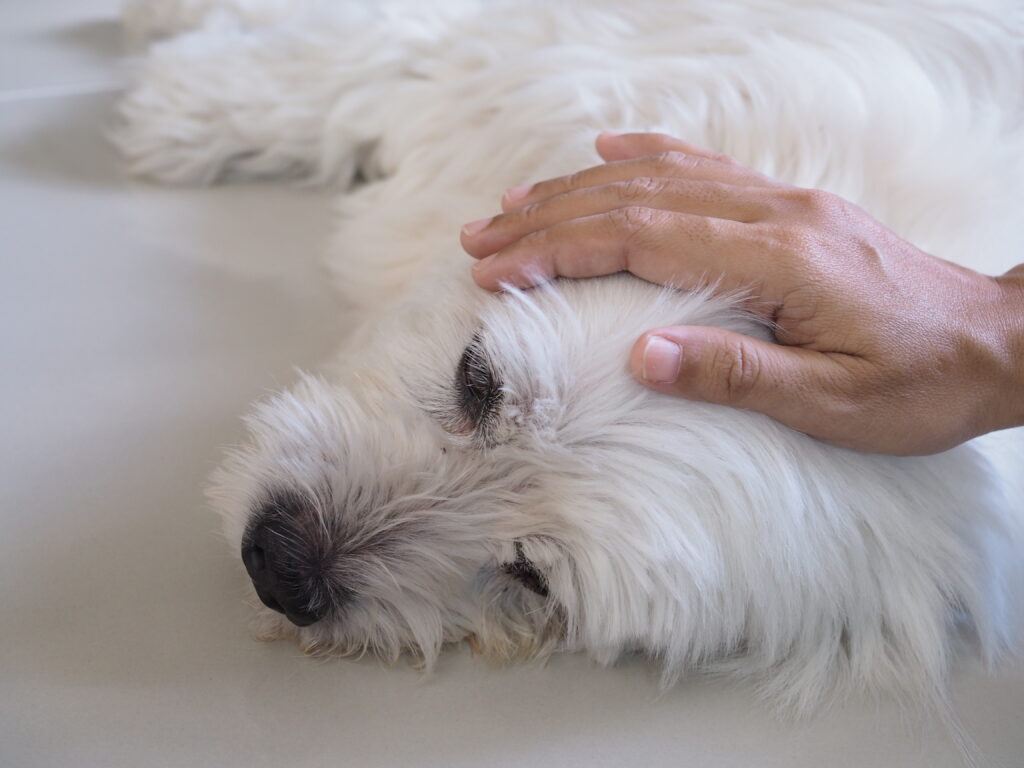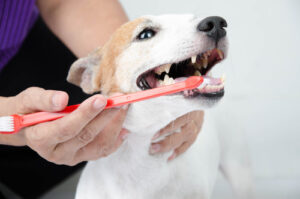Have you ever wondered whether your pet was in pain? Dogs and cats often hide their discomfort, making it difficult for even the most diligent pet owner to suspect a problem. Below, we’ll attempt to shed more light on the subject of pain in dogs and cats, including telltale signs of discomfort, what could be causing it, and how your pet’s pain can be treated. At Pet Townsend Veterinary Clinic in Townsend, WA, we’re committed to being a source of information so you can make the best treatment decisions for your pet. We encourage you to call us at (360) 379-1133 if you have any concerns or need more advice.

What are the Signs of Pain in Dogs?
Dogs may not always express their pain vocally, so we need to observe their behavior closely. Here are some indicators that your canine might be hurting:
Behavioral Changes
Keep an eye out for shifts in your dog’s behavior, such as increased irritability, aggression, or withdrawal.
Mobility Issues
Notice if your dog is limping, struggling with stairs, or having difficulty getting up or lying down.
Appetite Fluctuations
Sudden changes in appetite, including reduced interest in food or water, may signal pain.
Excessive Grooming
Dogs may excessively lick or chew a specific area when experiencing discomfort.
Restlessness
If your dog frequently changes resting spots or can’t find a comfortable position, it may be due to pain.
Whimpering or Whining
While some dogs vocalize pain, others may whimper or whine when touched.
What are the Signs of Pain in Cats?
Cats are known for their stoic nature, making it even more challenging to identify their pain. Here are some signs that might help you detect discomfort in your feline friend:
Altered Grooming Habits
Cats may groom less when in pain, leading to a disheveled appearance.
Hiding Behavior
If your cat is hiding more than usual and not coming out when called, it could be a sign of pain or distress.
Appetite Changes
Like dogs, cats may lose their appetite when they’re not feeling well.
Litter Box Behavior
Pay attention to any shifts in litter box habits, such as urinating outside the box or straining to urinate.
Increased Agitation
Cats may become more irritable and aggressive when they are in pain.
Vocalization
Some cats may meow excessively when experiencing discomfort.
Common Causes of Pain in Pets
Acute and chronic injuries and diseases of all kinds can cause discomfort in dogs and cats. Understanding the potential reasons for your pet’s pain is vital for early detection. Here are some common factors that can lead to pain in pets:
- Arthritis: Osteoarthritis can affect both dogs and cats, causing ongoing joint pain and stiffness.
- Dental Issues: Dental problems, including gingivitis, periodontal disease, oral abscesses, and tooth resorption can result in severe pain in your pet’s mouth.
- Injuries: Accidents or falls can lead to various injuries, causing pain.
- Digestive Problems: Gastrointestinal issues can lead to abdominal discomfort and pain.
- Infections: Infections, such as ear or urinary tract infections, can be painful for pets.
- Chronic Conditions: Conditions like cancer or diabetes can cause ongoing pain and discomfort.
Pain Relief Options for Dogs and Cats
Once we’ve worked with you to identify the signs and causes of your pet’s pain, we can take the next step and explore pain relief options. You should always consult with your veterinarian regarding pain relief for your pet, as some over-the-counter medications can be harmful to them.
- Medications: Your vet may prescribe suitable pain-relieving medications tailored to your pet’s condition.
- Physical Therapy: Physical therapy and rehabilitation can help improve mobility and reduce pain.
- Dietary Adjustments: A special diet may be recommended for your pet’s specific condition.
- Alternative Therapies: Acupuncture, laser therapy, and chiropractic care can also provide benefits for pain management.
- Lifestyle Modifications: Make changes to your pet’s living environment to reduce stress or discomfort.
Talk to Us About Your Pet’s Needs
Early detection can enable timely, effective intervention and enhance the quality (and longevity) of your pet’s life. If you have concerns or need more information about your pet’s health, please reach out to Pet Townsend Veterinary Clinic in Port Townsend, WA, at (360) 379-1133. We are committed to supporting your pet’s health and happiness in every way possible.




